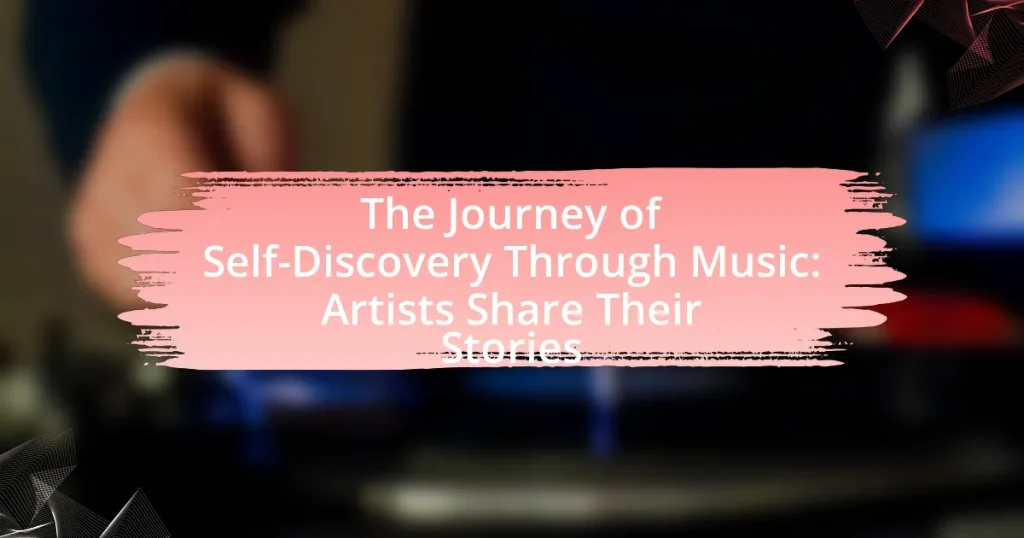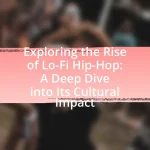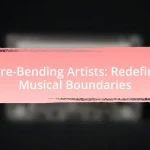The article explores the journey of self-discovery through music, highlighting how artists use their craft to express their identities, emotions, and experiences. It examines the transformative process of songwriting, the influence of personal experiences on musical narratives, and the role of vulnerability in fostering authentic connections with audiences. Key themes include the impact of societal expectations, the challenges artists face, and the benefits of collaboration in enhancing creativity. Additionally, the article discusses practical steps artists can take to deepen their self-exploration, such as journaling and engaging with various musical styles.
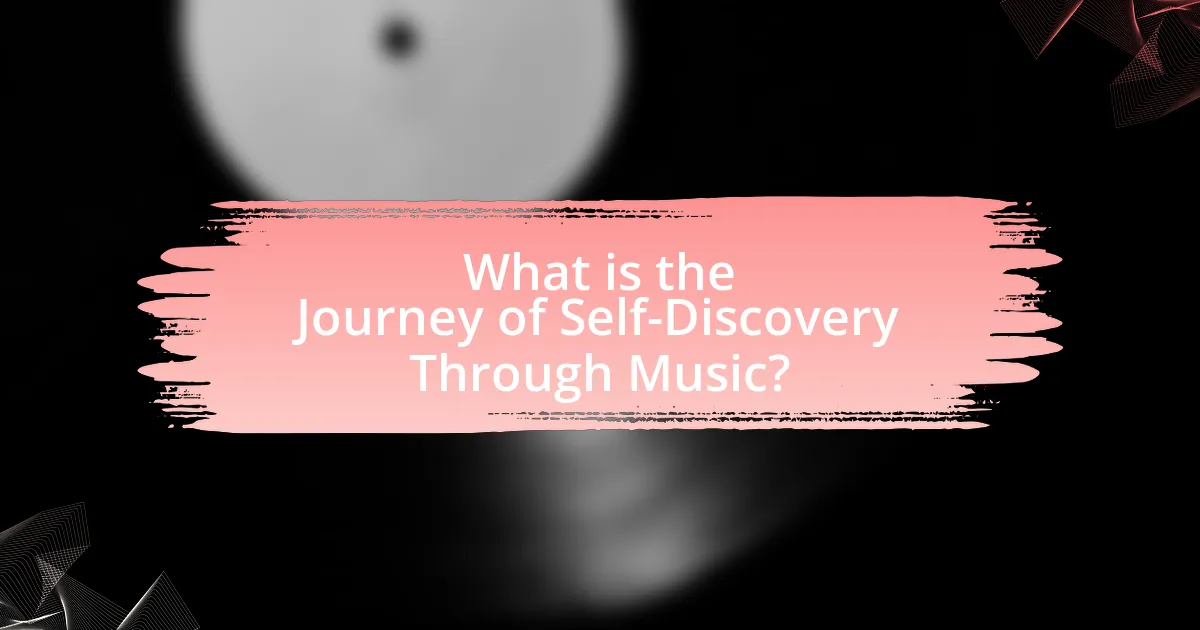
What is the Journey of Self-Discovery Through Music?
The journey of self-discovery through music involves exploring one’s identity, emotions, and experiences through the creation and consumption of music. This process allows individuals to express their innermost thoughts and feelings, often leading to personal growth and understanding. For instance, many artists, such as Taylor Swift and Kendrick Lamar, have shared how their music reflects their life experiences, struggles, and transformations, illustrating the profound connection between music and self-exploration. Research indicates that engaging with music can enhance emotional awareness and facilitate introspection, further validating the role of music as a powerful tool for self-discovery.
How do artists define their journey of self-discovery through music?
Artists define their journey of self-discovery through music as a transformative process that allows them to explore their identities, emotions, and experiences. This exploration often manifests in songwriting, where personal narratives and feelings are expressed, enabling artists to connect with their inner selves and their audiences. For instance, artists like Taylor Swift and Eminem have openly discussed how their music reflects their personal struggles and growth, illustrating the therapeutic nature of songwriting. Research indicates that engaging in creative expression, such as music, can lead to increased self-awareness and emotional regulation, further validating the significance of music in the self-discovery process for artists.
What personal experiences influence an artist’s musical journey?
Personal experiences such as childhood environment, cultural background, and significant life events profoundly influence an artist’s musical journey. For instance, artists often draw inspiration from their upbringing, where exposure to various musical genres and family traditions shapes their artistic identity. Additionally, pivotal moments like loss, love, or personal struggles can lead to the creation of deeply resonant music, as seen in the works of artists like Adele, whose songs often reflect her experiences with heartbreak and personal growth. These experiences not only inform the themes and emotions conveyed in their music but also contribute to the authenticity and relatability that resonate with audiences.
How does music serve as a medium for self-exploration?
Music serves as a medium for self-exploration by allowing individuals to express their emotions, thoughts, and experiences in a creative format. Through songwriting and listening, people can confront their feelings, reflect on personal narratives, and gain insights into their identities. Research indicates that engaging with music can enhance emotional awareness and facilitate personal growth, as evidenced by studies showing that music therapy significantly improves self-esteem and emotional regulation in participants. This connection between music and self-discovery is further supported by artists who often share their personal journeys through their work, illustrating how music can serve as a powerful tool for understanding oneself.
Why is self-discovery important for musicians?
Self-discovery is crucial for musicians because it enables them to understand their unique artistic identity and express their authentic voice. This understanding fosters creativity and innovation, allowing musicians to connect deeply with their audience. Research indicates that self-awareness enhances emotional intelligence, which is vital for artists to convey genuine emotions through their music. For instance, a study published in the Journal of Personality and Social Psychology found that individuals with higher self-awareness are more effective in expressing their feelings, leading to more impactful performances. Thus, self-discovery not only shapes a musician’s style but also enhances their ability to resonate with listeners.
What role does vulnerability play in an artist’s journey?
Vulnerability plays a crucial role in an artist’s journey by enabling authentic expression and emotional connection with their audience. When artists embrace vulnerability, they often share personal experiences and emotions, which can resonate deeply with listeners, fostering a sense of shared humanity. Research indicates that artists who openly express their vulnerabilities can create more impactful and relatable work, as seen in the success of musicians like Adele and Taylor Swift, who often draw from their personal struggles in their songwriting. This connection not only enhances the artist’s creative process but also builds a loyal fan base that appreciates the honesty and depth in their art.
How can self-discovery enhance an artist’s creativity?
Self-discovery enhances an artist’s creativity by fostering a deeper understanding of their identity and emotional experiences. This process allows artists to tap into their authentic selves, leading to more genuine and innovative expressions in their work. Research indicates that self-reflection and personal exploration can significantly boost creative output, as artists who engage in self-discovery often produce more original and resonant art. For instance, a study published in the Journal of Creative Behavior found that individuals who actively engage in self-exploration report higher levels of creative thinking and problem-solving abilities. Thus, self-discovery serves as a catalyst for artistic innovation and expression.
What are the common themes in artists’ stories of self-discovery?
Common themes in artists’ stories of self-discovery include personal struggle, emotional vulnerability, and the search for authenticity. Artists often recount their battles with identity, mental health, and societal expectations, which serve as catalysts for their creative expression. For instance, many musicians explore their past traumas or life experiences in their lyrics, revealing how these elements shape their artistic voice. Additionally, the theme of transformation is prevalent, as artists frequently describe their journeys toward self-acceptance and the realization of their true selves through their work. This narrative of growth is supported by numerous autobiographies and interviews, where artists like Lady Gaga and Kendrick Lamar discuss their paths to understanding and embracing their identities.
How do different genres of music reflect personal journeys?
Different genres of music reflect personal journeys by encapsulating the emotional and experiential narratives of individuals. For instance, country music often tells stories of hardship, love, and resilience, mirroring the personal struggles and triumphs of its artists, as seen in the works of artists like Johnny Cash and Dolly Parton. Similarly, hip-hop frequently addresses themes of identity, social justice, and personal growth, with artists like Kendrick Lamar using their lyrics to narrate their life experiences and societal challenges. Rock music, on the other hand, often explores themes of rebellion and self-discovery, as exemplified by artists like Bruce Springsteen, who reflects on his own life journey through his songs. These genres serve as a medium for artists to express their unique experiences, making music a powerful tool for personal storytelling and connection.
What themes are prevalent in pop music narratives?
Prevalent themes in pop music narratives include love, heartbreak, empowerment, and self-discovery. Love often serves as a central theme, with songs exploring romantic relationships and emotional connections. Heartbreak frequently follows, depicting the pain of lost love and the journey of healing. Empowerment is another significant theme, where artists convey messages of resilience and strength, encouraging listeners to overcome challenges. Self-discovery is also prominent, as many pop songs reflect personal growth and the quest for identity. These themes resonate widely, evidenced by chart-topping hits that consistently address these emotional experiences, making them relatable to a broad audience.
How do rock and folk genres express self-discovery differently?
Rock and folk genres express self-discovery differently through their thematic focus and musical style. Rock often emphasizes rebellion, personal struggle, and emotional intensity, reflecting a journey of self-discovery that is loud and confrontational, as seen in the works of artists like Jimi Hendrix and Nirvana, who explore themes of identity and existential angst. In contrast, folk music typically conveys introspection, storytelling, and connection to nature, highlighting personal narratives and communal experiences, as exemplified by artists like Bob Dylan and Joan Baez, who use lyrical simplicity to evoke deep emotional resonance and reflection. This distinction illustrates how rock’s aggressive sound contrasts with folk’s gentle melodies, shaping the listener’s experience of self-discovery in unique ways.
What challenges do artists face during their journey?
Artists face numerous challenges during their journey, including financial instability, creative blocks, and the pressure of public perception. Financial instability often arises from inconsistent income, making it difficult for artists to sustain their careers. Creative blocks can hinder the artistic process, leading to frustration and self-doubt. Additionally, the pressure of public perception can create anxiety, as artists may feel compelled to meet audience expectations or conform to industry standards. These challenges are well-documented, with studies indicating that 70% of artists report experiencing financial stress, and many cite mental health issues stemming from the pressures of their profession.
How do societal expectations impact an artist’s self-discovery?
Societal expectations significantly influence an artist’s self-discovery by shaping their creative expression and identity formation. Artists often feel pressured to conform to societal norms regarding genre, style, and subject matter, which can lead to internal conflict between personal authenticity and external validation. For instance, a study by the University of California found that artists who adhere to societal expectations may experience a decrease in creative satisfaction, as they prioritize commercial success over personal expression. This dynamic can hinder their ability to explore and articulate their true selves, ultimately impacting their artistic journey and the authenticity of their work.
What internal struggles do artists commonly encounter?
Artists commonly encounter internal struggles such as self-doubt, fear of failure, and the pressure to conform to societal expectations. These challenges can hinder their creative expression and lead to emotional turmoil. For instance, a study published in the Journal of Creative Behavior found that 70% of artists reported experiencing anxiety related to their work, which often stems from the fear of not meeting their own or others’ standards. Additionally, many artists grapple with the conflict between their artistic vision and commercial viability, creating further internal conflict.
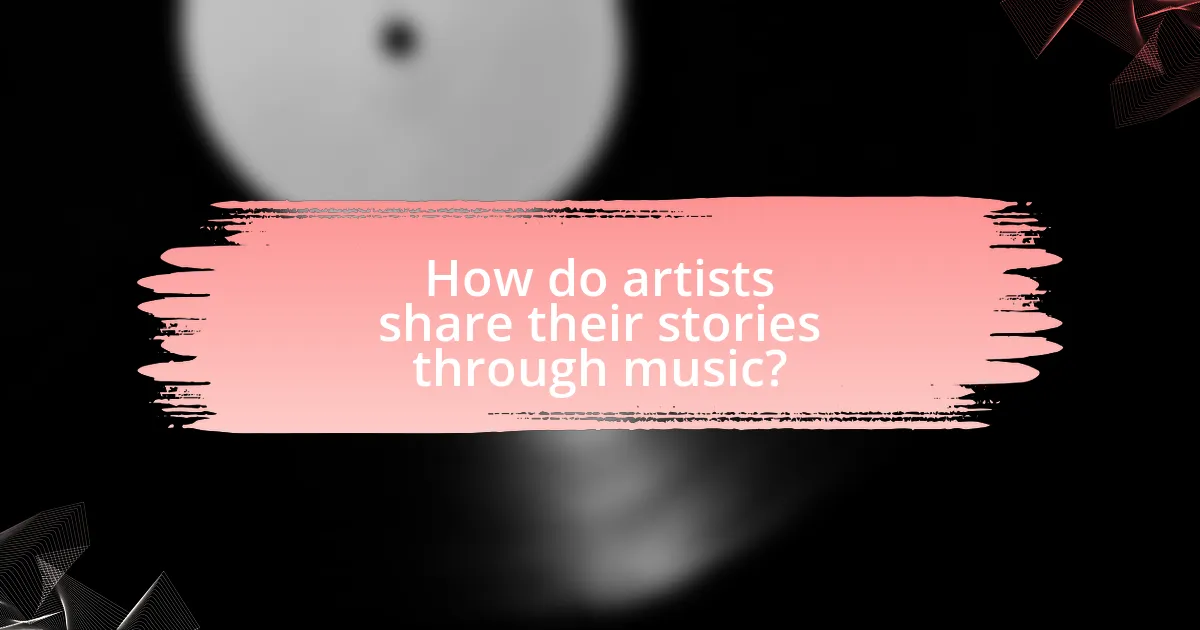
How do artists share their stories through music?
Artists share their stories through music by using lyrics, melodies, and instrumentation to convey personal experiences and emotions. Through songwriting, artists express their thoughts and feelings, often drawing from their own life events, struggles, and triumphs. For example, Taylor Swift frequently incorporates autobiographical elements into her songs, allowing listeners to connect with her narrative on a personal level. Additionally, the use of specific musical styles and genres can enhance the storytelling aspect, as seen in folk music, which often emphasizes narrative and personal history. This combination of lyrical content and musical composition creates a powerful medium for artists to communicate their unique journeys and resonate with audiences.
What techniques do artists use to convey their experiences?
Artists use techniques such as storytelling, symbolism, and emotional expression to convey their experiences. Storytelling allows artists to share personal narratives through lyrics or compositions, creating a connection with the audience. Symbolism is employed to represent complex emotions or experiences visually or sonically, enhancing the depth of the message. Emotional expression is crucial, as artists often use their vocal delivery, instrumentation, and dynamics to evoke feelings that resonate with listeners. For instance, the use of minor keys in music can convey sadness or introspection, while major keys often express joy or triumph. These techniques are foundational in transforming personal experiences into relatable art.
How does songwriting reflect personal growth?
Songwriting reflects personal growth by serving as a medium for artists to express their evolving emotions, experiences, and insights. Through the process of writing lyrics and melodies, songwriters often confront their past, articulate their struggles, and celebrate their achievements, which fosters self-awareness and emotional healing. For instance, artists like Taylor Swift have documented their personal transformations across albums, showcasing how their songwriting evolves in response to life events, relationships, and maturity. This evolution in their music not only mirrors their personal journeys but also resonates with listeners, illustrating the universal nature of growth and change.
What role does performance play in sharing an artist’s journey?
Performance serves as a vital medium for artists to convey their personal narratives and emotional experiences. Through live performances, artists engage directly with their audience, allowing them to express their journey of self-discovery and the evolution of their artistry. This connection fosters a shared experience, where the audience can witness the artist’s growth and transformation in real-time. For instance, studies have shown that live music can evoke strong emotional responses, enhancing the audience’s understanding of the artist’s story. Thus, performance not only showcases an artist’s talent but also acts as a powerful storytelling tool that deepens the audience’s appreciation of the artist’s journey.
How do collaborations influence an artist’s self-discovery?
Collaborations significantly influence an artist’s self-discovery by exposing them to diverse perspectives and creative processes. When artists work with others, they encounter new ideas, techniques, and emotional expressions that challenge their existing artistic boundaries. This interaction fosters personal growth and encourages introspection, as artists reflect on their own styles and beliefs in relation to their collaborators. Research indicates that collaborative environments enhance creativity and innovation, leading to a deeper understanding of one’s artistic identity. For instance, a study published in the Journal of Creative Behavior found that artists who engage in collaborative projects report increased self-awareness and a broader artistic vision.
What benefits do artists gain from working with others?
Artists gain collaboration benefits from working with others, including enhanced creativity, diverse perspectives, and skill development. Collaborating with fellow artists allows for the exchange of ideas, which can lead to innovative approaches and unique artistic expressions. For instance, a study published in the Journal of Creative Behavior found that collaborative environments significantly boost creative output by 15% compared to solo work. Additionally, artists can learn new techniques and gain insights from their peers, enriching their own practice and expanding their artistic repertoire.
How can collaborations lead to new insights and perspectives?
Collaborations can lead to new insights and perspectives by combining diverse experiences and skills of different individuals. When artists collaborate, they share unique viewpoints and creative processes, which can result in innovative ideas and artistic expressions that may not have emerged in isolation. For instance, a study by the National Endowment for the Arts found that collaborative projects often yield higher levels of creativity and originality, as participants challenge each other’s assumptions and inspire new ways of thinking. This exchange of ideas fosters a richer understanding of artistic themes and personal narratives, enhancing the overall depth of the work produced.
What practical steps can artists take to enhance their journey of self-discovery through music?
Artists can enhance their journey of self-discovery through music by engaging in regular self-reflection and experimentation with different musical styles. Self-reflection allows artists to understand their emotions and experiences, which can be translated into their music, fostering authenticity. Experimentation with various genres and techniques encourages creativity and helps artists discover their unique sound, leading to personal growth. Research indicates that musicians who explore diverse musical forms often report higher levels of satisfaction and self-awareness in their artistic expression.
How can journaling and reflection aid in the process?
Journaling and reflection can significantly aid in the process of self-discovery through music by providing a structured way to explore thoughts and emotions. This practice allows artists to articulate their experiences, leading to deeper insights about their creative journey. Research indicates that expressive writing, such as journaling, can enhance emotional clarity and self-awareness, which are crucial for artistic development. For instance, a study published in the Journal of Experimental Psychology found that individuals who engage in reflective writing report increased emotional well-being and improved problem-solving skills. Thus, journaling and reflection serve as essential tools for artists to navigate their personal and creative landscapes effectively.
What resources are available for artists seeking to explore their identity through music?
Artists seeking to explore their identity through music can access various resources, including workshops, online courses, and community programs. Workshops often provide hands-on experiences where artists can collaborate and share their stories, fostering a supportive environment for self-exploration. Online platforms like Coursera and MasterClass offer courses specifically focused on songwriting and personal expression, allowing artists to learn at their own pace. Additionally, community programs, such as those offered by local arts organizations, often include mentorship opportunities and performance spaces that encourage artists to express their identities through their music. These resources collectively support artists in their journey of self-discovery and identity exploration.
